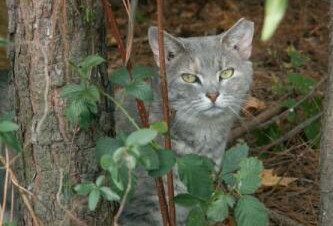How to live with outdoor cats in your neighborhood
 |
| Community cats who have been spayed and neutered usually have an ear clipped. [Fairfax County Animal Shelter] |
The following piece was written by an Annandale resident and cat rescuer in response to a recent Annandale Blog post about a small colony of feral cats.
The public needs to be educated about feral cats, which I prefer to call “community cats.” I help them by having them spayed and neutered through county programs and providing feeding sites where they live.
This helps the cats and the public coexist by ensuring the neighborhood cats live in a stable community.
Community cats are members of the domestic cat species just like pet cats, but are usually not socialized to people and therefore are not adoptable. They typically live in groups called colonies and have strong social bonds with other members of the colony.
Because community cats are not socialized and not adoptable, they do not belong in animal shelters, where virtually 100 percent of them are killed. Instead, they should be neutered, vaccinated, and returned to their outdoor home.
Trap-Neuter-Return (TNR) is the only effective and humane way to stabilize community cat populations, allowing them to peacefully coexist with local residents. Under the TRN approach, cats are humanely trapped and taken to a veterinarian where they are neutered and vaccinated.
Kittens and socialized cats are placed into loving homes. Healthy adult cats are returned to their colony site, where they are often provided continuing care and food by volunteers.
TNR works. It prevents cats from having more kittens. Their health and quality of life are improved, and the population stabilizes and declines over time. The behaviors and stresses associated with mating, such as yowling and fighting, stop.
The public can make a difference and save lives. There are many individuals who quietly go each day to address the needs of cats in our communities. If you would like to know more about how to help community cats, the Alley Cat Allies website provides lots of information.
Individuals may also find valuable information on how to help community cats by contacting the Fairfax County Animal Shelter, 703-830-1100.
Shelter staff occasionally host workshops on helping community cats. The next ones are Tuesday, Jan. 31, and Monday, Feb. 27. Both sessions are 7 p.m. at the Kinstowne Library in Alexandria. To register, send an email to [email protected].
Anyone who has taken the class can borrow a trap from the animal shelter for free.


Thank you for the information, and thanks for your humane and pragmatic work!
Someone please think about the birds. These and all outdoor cats affect the bird population since they all hunt birds.
Isn't the house cat a non native species? Perhaps even an invasive species since it kills so many small animals–snakes, birds, rabbits, squirrels, and other rodents–which are prey for various native predators? Also, aren't there legitimate concerns about disease the cats might carry and transfer to other wildlife? Since sterilization isn't cheap and given these potential societal costs, extermination might be a more prudent option.
Yep, they are invasive. I generally think they should be removed by any means necessary.
A feral cat had a litter of kittens under our porch. We called in experts who did what this article suggests. The kittens went to good homes. We feed the mother, and she has become our "outdoor cat", just as beloved as our "indoor cat" who never goes outside. She is not fully socialized, but we can pet her and play with her a bit. Because she is well fed, she isn't taking such a toll on wildlife. It's a good program and the volunteers do great work for our communities.
For me these feral cats are a nuisance. I live in an apartment complex and they can't do anything about them and the neighbors feed the cats. It scares me when I leave the house in the early AM and come home in the PM. They sit there looking at me with those eyes that see right through me. lol